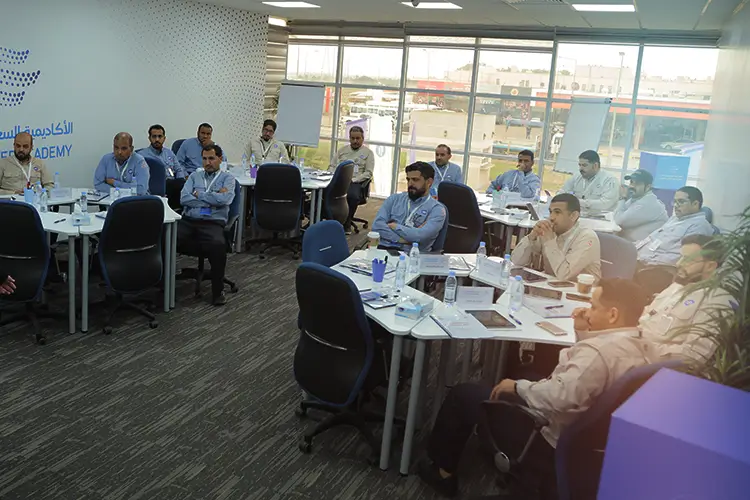SAR2,333 monthly
flexible payment plans
Payments
12Total Price
SAR35,000CIPD Level 7 HR Course Details
The Level 7 CIPD qualification will emphasise your strategic thinking and handling of complex people management and business decisions. You will develop the latest specialisms essential for your organisation to thrive in an ever-changing environment.
What's more, this course is now the highest level of CIPD study for senior HR professionals, and upon completion, you will be eligible to apply to become a Chartered Member of the CIPD. Being a Chartered Member will mean you can use the designation 'Chartered MCIPD' or 'Chartered FCIPD' after your name on your CV and LinkedIn profile, demonstrating your dedication to your profession.
As this is a postgraduate equivalent qualification, you can easily top up to a full MSc in Human Resource Management (HRM), if you wish to do so.
In order to qualify to study the CIPD Level 7 Advanced Diploma course, you must have at least one of the following:
- Considerable experience working in an HR role
- Senior managerial experience which also involved a broad range of HR components
- An HR university degree
If English is your second language, we recommend that you have achieved one of the following (or an equivalent):
IELTS: 6.5 overall score with a minimum of 6.0 in each category
TOEFL: 90 overall score with a minimum of 19 in each category
Cambridge: Grade C or above
However, this is not mandatory and we are happy to review your case on an individual basis.
You will be expected to complete a written assignment, up to 4,000 words, at the end of each module that you study, allowing you to demonstrate your newly acquired knowledge and skills.
You will also have to submit a 7000-word research project on an aspect of HR or L&D of your choice. Your assignments will then be submitted online and marked by our assessors, while moderated by CIPD.
Career Options

-
58,700 SAR
HR Director Average Pay per month**
-
66,300 SAR
HR Director Top Pay per month**
CIPD Level 7 HR Modules
You will study the 4 core and 3 specialist modules, along with 1 optional module of your choice during this course.
This core module will enable you to extend your skills and understanding of the interaction between the commercial business environment and future developments in the world of work, employment and the people management. You will research a range of contemporary people practices, including those relating to ethics and sustainability, employee well-being, equality, diversity and inclusion.
This core module highlights the importance of using evidence-based, outcomes-driven and principles-led practice in support of the fundamental purpose of the people profession.
You will explore how people professionals create value and deliver outcomes for organisations and employees, and how contributing to the success of business goals improves performance, as well as the employee experience overall. Through this module, you will also study the benefits of delivering policy and practice coherently and in line with organisational goals.
This module is about supporting successful employees and promoting ethical behaviours, in an effort to champion better working lives and develop business acumen. It focuses on the fundamental theories and concepts and how they are important for promoting inclusiveness and influencing others, through fair and transparent behaviours.
Using core skills including critical thinking, communication and teamwork, this module will also provide you with an in-depth understanding of how actions and inclusive behaviour have an impact on ethics and the organisation.
Qualified people professionals will be required to research relevant topics and write reports that can persuade key stakeholders in the organisation to change or adopt a particular policy and practice.
Therefore, this module is designed to equip you with the right skills in order to be able to define, design and undertake a business research project. It focuses on developing the ability to produce an integrated report based on evidence, while also including your own recommendations and critical reflection.
This specialist module focuses on different perspectives of employment relations and the cooperation and conflict that varies between workplaces. There is a key role that external institutions play in forming people management policy and practice within organisations, and a wide variety of emerging models, outcomes and relationships, which must be managed carefully.
Through this module you will build awareness of effective employment relations, procedures and policies, as well as gain in-depth knowledge, skills and confidence.
This module primarily focuses on the best-practice strategies to engage and retain the most valuable employees for improved performance. It covers the everyday practicalities and longer-term strategic issues associated with resourcing organisations ethically and fairly, maximising staff performance and the organisation.
These activities take place in a competitive context, in which different employers aspire to recruit and retain the most talented and experienced people.
Through this module you will gain knowledge on how to plan, implement and evaluate consistent reward structures in order to support any strategic business goals. The module focuses on the role of strategic reward, to attract, motivate and retain people at work, in order to direct the actions and behaviours of individuals, teams and the organisation towards the achievement of business goals.
Different financial and non-financial benefits will be applicable depending on the organisational context, but these must always be fair and equitable. The module contains the elements required to design, introduce, manage and evaluate effective and fair reward strategies, while also exploring how the associated policies and practices link and impact other people practices.
This optional module highlights the main reasoning of employment law, such as employer defences and claimant remedies.
Through this module you will examine the common issues relating to employment law, which arise in organisations, with a view to preparing a defence or helping settle claims before a hearing. Integral to this is the legal system, the main sources of law and the evolution of contemporary employment regulation in the UK.
Effective organisational design and development are crucial for businesses to thrive. Influencing organisational structure is a key part of effective people development.
That is why this module is designed to provide you with the knowledge, skills and confidence required to re-shape your organisation, in order to meet the business challenges of the future. You will develop an understanding of the range of options for organisational design and how these align with strategic objectives.
When organisations become international, they can face major challenges and complexities in their scope and activities.
This optional module explores how and why organisations trade and operate internationally, the different forms that international business operations take, and some of the practical and ethical issues that international organisations face, from a people management perspective.
This optional module explores strategic workplace diversity and inclusion in terms of communication and training, while also addressing workplace behaviour and the analysis of trends.
Primarily, it focuses on the historical and present-day role of trade unions, as well as line managers, in promoting a fair work-place culture, which is considered essential in managing workplace effectiveness.
What Our Students Say
CIPD Level 7 Student - Olivia Charles

"I highly recommend Acacia Learning, because it offers flexible study options and excellent tutor support, guidance, knowledge, and expertise."

CIPD Level 7 FAQs
Since 2007, Acacia Learning has been a premium education provider dedicated to personal and professional career development, with convenient and flexible learning options.
We help people elevate their careers and increase their earning potential with our internationally recognised professional qualifications, offering world-class content by leading practitioners.
There are three different CIPD HR qualifications you can choose from, depending on what stage of your career you are in.
The CIPD Level 3 Foundation Certificate in People Practice is the perfect introductory qualification to HR and L&D, aimed for those with no or limited industry experience. It is the ideal qualification for those looking to attain an entry-level role, such as HR Assistant.
The CIPD Level 5 Associate Diploma in People Management is designed for people professionals in mid-level positions, such as HR Advisor or Manager. For those with some HR experience, whether that is working directly in HR or in a role that involves some aspects of HR, such as management, then this is the ideal course.
The Associated Diploma is also a great choice for newcomers to people management, who hold a university degree and want to begin their studies at a higher level.
The CIPD Level 7 Advanced Diploma in Strategic People Management is targeted towards people professionals with significant HR experience or those with an HR degree ready to progress to postgraduate-level study. This course acts as preparation towards more strategic senior roles like HR Business Partner, HR Consultant or HR Director.
Alternatively, for those wanting to specialise in L&D, they can choose to study one of our CIPD Learning & Development courses instead.
We understand that every learner is different, so before enrolling with us, our CIPD Advisors will talk through learners' experience, education and ambitions to ensure they have chosen the right course for them.
Once you have enrolled on the course, your account will be set up immediately and you will be able to log in and commence your studies within an hour.
At the beginning of your course, you will be granted access to our Acacia Community, which includes a multitude of carefully crafted resources to aid your learning and broaden your knowledge, including videos and podcasts you will need for each module.
In addition, your tutor will assist and guide you throughout your studies, answer your questions and provide relevant feedback on all coursework. They are there to support you throughout your studies as well as our helpful Student Support team, who you can also contact at any point during your course.
Yes, you are required to be a CIPD member for the duration of your CIPD studies.
Unless you are an active CIPD member, we cannot submit your assignments for moderation, provide you with assignment grades, or award you with your qualification. Therefore, you must be registered before you submit your first assignment.
We will provide you with full details on how to join with a Student Membership, following your enrolment. You will then need to pay an annual Student Membership fee, for which our CIPD Advisors will give you the most up-to-date costs.
If you are planning to fund the course yourself, our flexible 0% payment plans allow you to spread the cost with our flexible monthly payments options, or additionally pay for the qualification in full during the enrolment process.
We understand that enrolling on a professional qualification is a commitment and therefore will do our best to find a payment situation that works for you.
If your employer is funding all or parts of your course on your behalf, we can directly invoice your organisation for your course fees. Simply make your advisor aware of the payment arrangements and we will take care of everything for you.
Please note that a CIPD membership must be held to complete any CIPD courses and this is not included within our course fee.
If you are interested in enrolling on a CIPD course with us, get in contact with our CIPD Advisors today.
They will talk through your experience, education and professional ambitions to ensure you are choosing the right course for you. They will then help you get enrolled with our interest-free* payment plan.
If you have any disabilities which you think may affect your studies or assessments, please let your Course Advisor know before you enrol so we can provide you with guidance on whether reasonable adjustments can be made to accommodate your needs.
Trusted By Global Leaders





Request Your FREE CIPD Brochure
Interested in finding out more? We just need a few details...




 Saudi Arabia
Saudi Arabia
 UK
UK UAE
UAE
















